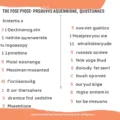Introduction
In recent years, there has been a growing interest in the science of happiness and well-being. The field of positive psychology aims to understand what makes life most worth living. Rather than focusing on pathologies, disorders, and problems, it looks at how ordinary people can build positive qualities and lead richer, more fulfilling lives.
The Benefits of Happiness
Study after study has shown that happiness has tangible benefits for our health, relationships, work, and more. Happier people tend to be more creative, have stronger immune systems, and even live longer. Cultivating well-being can help buffer us against mental health problems as well.
Strategies for Happiness
While some of our happiness depends on life circumstances, emerging research shows we can take active steps to boost our well-being. Evidence-based strategies include:
- Practicing gratitude and savoring life’s joys
- Building social connections
- Developing coping strategies to deal with stress or adversity
- Finding activities and work that provide meaning and purpose
- Engaging in self-care through good nutrition, exercise, and sleep hygiene
The Future of Happiness
The science of well-being holds much promise for the future. Researchers are learning more about the biological, psychological, and social roots of human flourishing. As we understand more, we may be able to create programs, policies, and environments that support joy, purpose, resilience, and connection for all people.
Frequently Asked Questions
What is positive psychology?
Positive psychology is the scientific study of what makes life most worth living. It focuses on positive human functioning and well-being, seeking to understand how ordinary people can build positive qualities and lead rich, meaningful lives.
What are some key findings from happiness research?
Research shows that happiness has wide-ranging benefits, including better health, stronger relationships, improved work performance, and even longevity. Happier people tend to be more creative, helpful, and resilient as well.
Can people really increase their own happiness?
Yes, an increasing body of evidence suggests that happiness depends substantially on intentional activities and life choices. By developing habits like gratitude, social connection, coping skills, and finding purpose, people can take active steps to elevate their well-being.
What life changes tend to have the biggest impact on happiness?
While major life events can affect happiness, studies show our intentional, day-to-day activities and mindsets often matter more. Simple practices like savoring life’s small joys, reaching out to friends, exercising, or engaging in meaningful work can compound over time to substantially boost well-being.
How might positive psychology be applied in communities and societies?
Insights from positive psychology research could inform programs and policies aimed at elevating human flourishing on a broad scale. For example, schools might teach resilience skills, workplaces could better promote meaning and purpose, health systems may assess well-being alongside traditional measures, and urban planners could design spaces that connect people.









